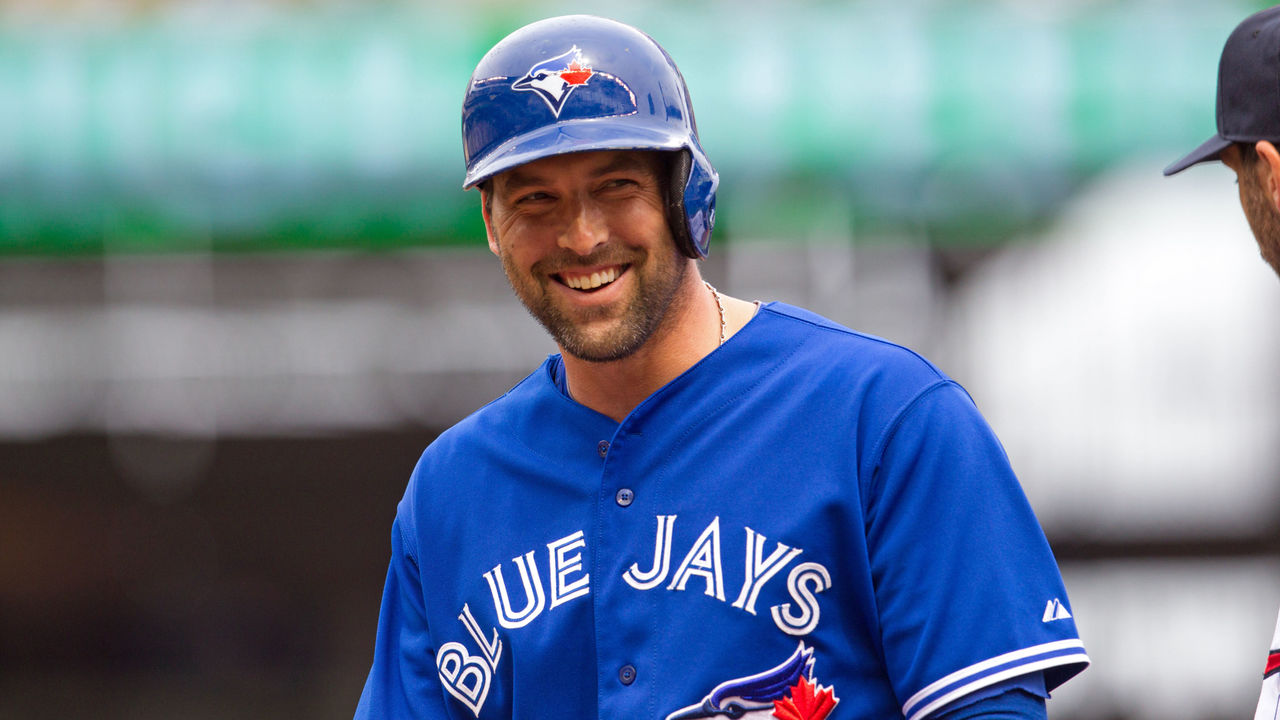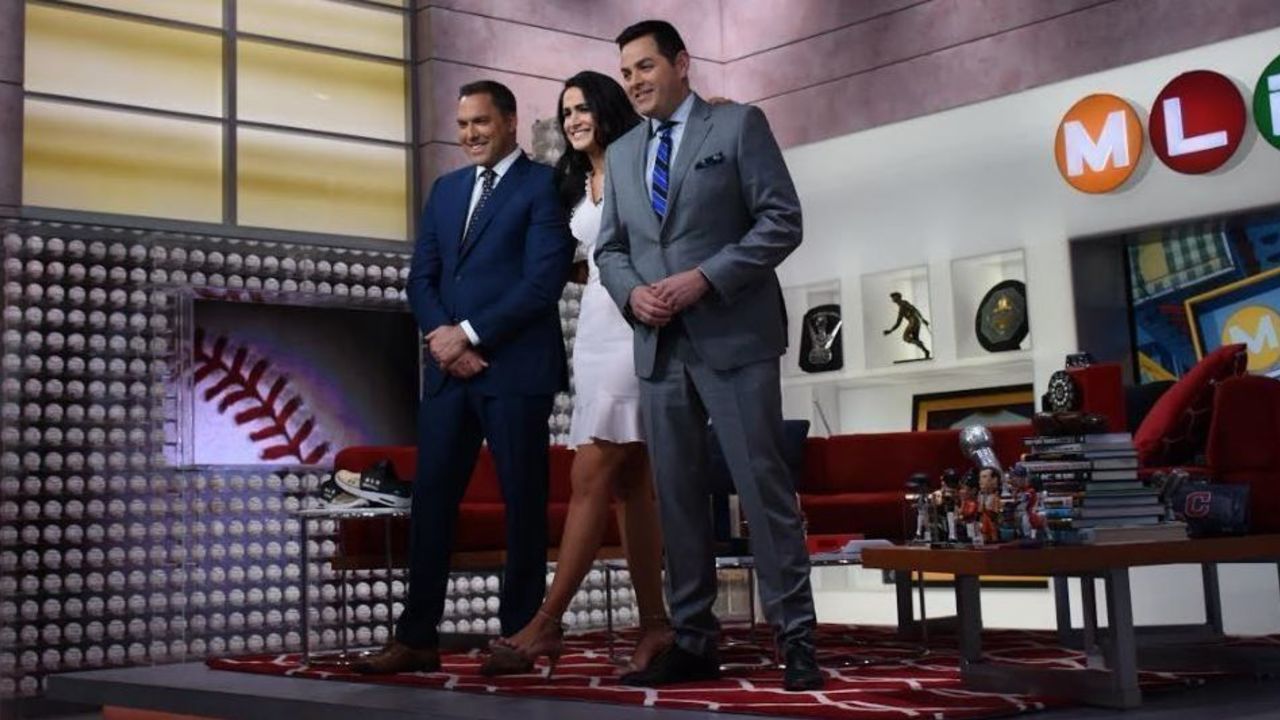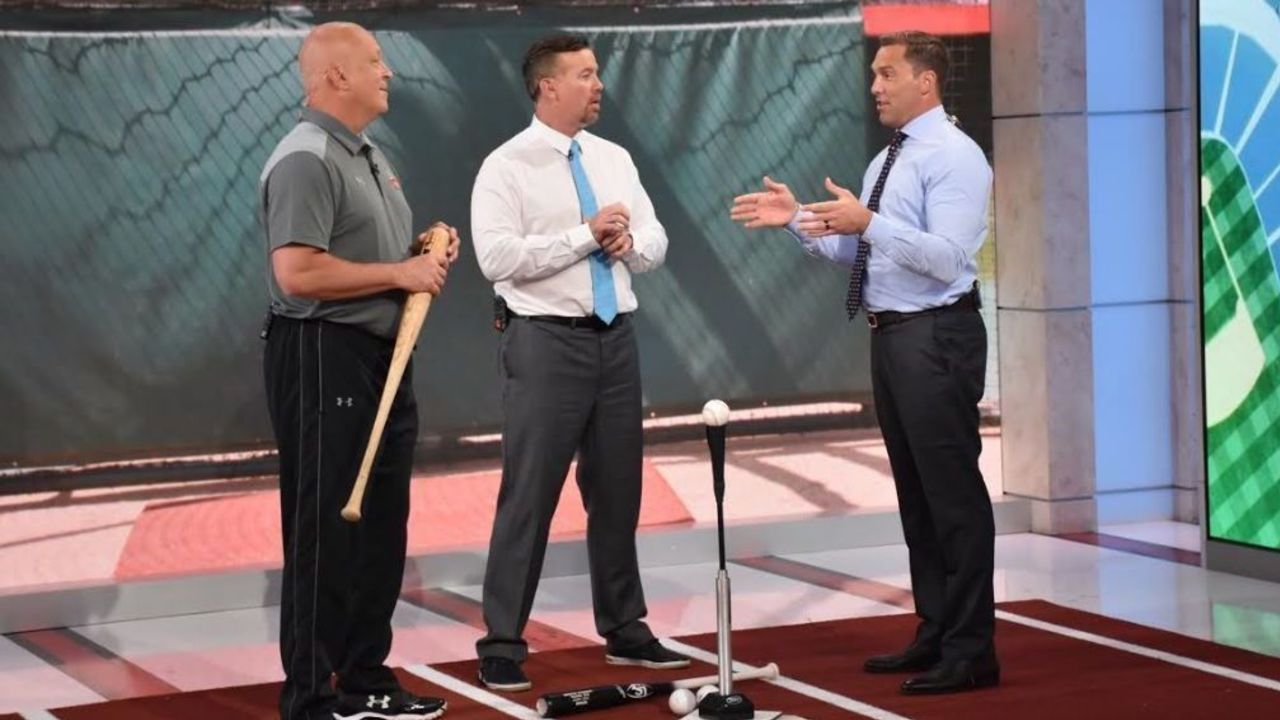The Grinder: How Mark DeRosa evolved from utility player to MLB analyst
Four years after ending a major-league tenure built on staying one step ahead of opposing pitchers, Mark DeRosa is thriving in a second career he never saw coming as the star of "MLB Central" on MLB Network.
"It wasn't something I aspired to be," DeRosa told theScore about becoming an analyst. "I was grinding to play and stay on rosters. I wasn't focusing on what I wanted to do when my career was over."
The 43-year-old's personality is infectious. His baseball IQ is off the charts. He's able to convey his message to the average fan as effectively as he can to someone who's spent their life in the game. On camera, he's a natural because he's himself. And that's what makes him one of the best analysts in the business.
These qualities are largely the product of hard work and an obsession with trying to consume as much knowledge as possible. He's not a Hall of Famer. Heck, he was never even an All-Star. But that doesn't matter when he talks about the game.
"Mark has established himself in this industry far greater than his ability to establish himself as a baseball player," Hall of Famer and fellow MLB Network analyst John Smoltz said. "Not everyone can reach a certain level but everyone can work hard and understand the game at a level where they can translate it better than most. Some of the greatest players in the world can't translate their success or their information to people where they can understand it. They just have the ability to be great and are genetically gifted but ask them to explain what they're doing and it may not come across."
'I just felt like I couldn't be great anymore'

(Photo courtesy: Getty Images)
A seventh-round pick by the Braves in 1996, DeRosa spent his first seven seasons in Atlanta before making stops with the Rangers, Cubs, Indians, Cardinals, Giants, Nationals, and Blue Jays.
He had to fight to stay on rosters and always knew his place in the clubhouse.
"I kind of feel that there's a totem pole in every walk of life and you should kind of know when you brush your teeth at night where you stand on it," DeRosa said. "I always knew where I stood on any given roster. Sometimes I was 25th man, sometimes I was creeping into single digits."
DeRosa never appeared in more than 150 games in a season over his 16-year career, but his work ethic, versatility, and leadership made him valuable in the clubhouse and helped him to eventually play more than 1,200 major-league games.
"You can't play that many years as not an everyday player if people don't see the value in what you're able to do," Smoltz said. "His talent level may not have allowed him to jump over some people that were ahead of him, and he was fine with that. He played an important role wherever he was and everyone who played with him could tell you the same thing."
As is the case for most professional athletes, the final years of his playing career weren't glamorous. Over his final six campaigns, he played on six different teams and only appeared in 497 games. Still, the decision to move on wasn't easy.
In 2013, he was limited to 88 appearances for the Blue Jays due to a wrist injury. An offer from his general manager in Toronto would have allowed him to prolong his career, but less than two months after playing his final game, DeRosa announced his retirement.
"I know I had an option picked up by Alex Anthopoulos for the 2014 season and then MLB Network offered me this job and I just felt like I couldn't be great anymore playing," DeRosa said. "I'd have flashes where I'd have a game or two and I loved being with the guys, loved being a sounding board, a veteran presence in the clubhouse, and I miss the game, miss it every day. But I wanted to wake up every morning and ... aspire to be great at something else."
'I was nervous to say something stupid'

(Photo courtesy: MLB Network)
DeRosa first got his feet wet in broadcasting when his agent approached him around 2011-12 about analyzing postseason games on TV.
"We had interviewed Mark on various shows on the network when he was still playing and you can see which guys have a dynamic personality and are able to translate that onto TV," coordinating producer Ethan Kleinberg said. "We knew that Mark was one of the guys that when his playing career was over that if that's what he wanted, certainly he would have the opportunity."
Senior producer Mark Capalbo told theScore, "As far as on-camera personality, he was always a natural. Once he got the technical side of it down he was a star."
But while DeRosa may have appeared cool and calm, he admits he struggled with some self-doubt early on. MLB Network is loaded with Hall of Fame talent, and DeRosa feared speaking out of turn and saying something that might offend a player.
"I was nervous to say something stupid. I was nervous to upset somebody. I was nervous to have a player think for one second that I didn't know what type of player I was," DeRosa said. "Those were the things I worried about. I know the game. I'm speaking about something I'm well-educated in, so I was comfortable talking the game. ... My biggest fear was always somebody being at home going, 'Well this guy was a .268 lifetime hitter, didn't really have a great career, how is he sitting up there being able to say those things?' That was my fear."
Relying on his knowledge and preparation helped DeRosa overcome that anxiety.
"By trusting that I know what I'm talking about. By not going for that moment. If you watch the show I very rarely attack a player. I'll attack you for mental mistakes because we've all made them. The physical I leave alone - balls are going to go through people's legs, we're not perfect," DeRosa said. "I just try and tell the truth. I always was that way in the clubhouse.
"I always felt that when I played, the truth will set you free - good, bad, indifferent. I'm not going to tell you the deepest, darkest secrets of the clubhouse, but when it came to just answering a question, I always felt truthful responses built relationships better."
(Video courtesy: MLB Central, May 3, 2018)
His preparation for "MLB Central" begins the night before. DeRosa typically identifies two or three games that he'll lock in on while following the top storylines around the league. He's got one game on his TV and one on his laptop, and if needed, he'll use his phone as a third screen. He'll also text with his producers throughout the night to brainstorm ideas.
"Mark works non-stop," Kleinberg said. "We're on text chains until 12 or 1 talking about the games."
DeRosa's on the road for the studio at 6:40 a.m. the next morning, followed by a production meeting, and then ready to go on air for 10:00 a.m.
"It's a lot of work. A lot of great people and a lot of time is put into it. We're up early," DeRosa said.
'That's the one meal I'm not missing'
DeRosa's passion for baseball is rivaled only by his passion for breakfast.
"I had five hard-boiled eggs, half a bagel, and a protein smoothie with strawberries and pineapples," DeRosa said. "I've always been a huge breakfast guy my whole life. That's the one meal I'm not missing."
His interview questions about breakfast have become a famous part of his repertoire.
"His food question has taken on a life of its own with the players," Kleinberg said.
Behind the scenes, DeRosa also applies his skills as an analyst to co-hosts Lauren Shehadi's and Robert Flores' first meal of the day.
"He thinks Taylor ham is the best creation ever," Shehadi said. "In the morning, whatever we have for breakfast, he says: 'Shehad, you gotta mix that with Taylor ham,' and I say, 'I don't even know what that is.'"
'He was able to pull some things out of me'
Heralded for his leadership as a player, DeRosa is still focused on bringing out the best in those around him, whether they're his coworkers or his interview subjects.
"He always says that 'My best teammates knew exactly what they were getting when I walked into the clubhouse,' so he kind of holds us to that similar standard," Shehadi added. "He holds us accountable because he wants everyone to give our best effort."
DeRosa believes he serves as a voice for players. He's never forgotten how hard the game is and wants to make sure he communicates that to fans.
Smoltz considers DeRosa's breakdowns with hitters a highlight of his broadcast career. To illustrate why DeRosa is special, you don't have to look any further than his work with Blue Jays slugger and former American League MVP Josh Donaldson.
The pair met when they were with the Cubs, which was also Donaldson's first major-league camp.
"He was always very charismatic, a very genuine person and very baseball-educated person," Donaldson told theScore. "He was somebody that I looked up to as a younger player in big-league camp."
Several years later, DeRosa reached out to Donaldson about doing a segment on MLB Network that would break down his swing. DeRosa said he knew Donaldson had a different approach to hitting and thought they could produce something that would interest viewers. DeRosa was right, as the segment unlocked a little-seen side of the star.
(Video courtesy: MLB Central, April 6, 2017)
"He's able to get things out of the guys in these interviews that frankly not everybody can get out of them," Kleinberg said. "The players seem to open up more with him. I don't know if that was just a producer going down there to shoot a feature, I don't think they get that same information. He has a unique way of bonding with these guys and they open up to him in a way that is different than with other people."
Donaldson agrees with that assessment of DeRosa's particular talent.
"I literally walked out that day and shot him a text and was like, 'Did that go well? Do you think that that went well?'" Donaldson recalled. "And he was like, 'That was awesome.' I wasn't really thinking about it being on TV, and it was more just me and him having a conversation. Having a relationship prior to that allowed that to happen. Where if it were somebody else - he was able to pull some things out of me that I might not have even brought up normally."
DeRosa says he hates leveraging his personal relationships with players in order to boost his new career, but he also believes they benefit from the coverage.
"What I was blown away with was not only (Donaldson) giving us the amount of time and footage he gave us, but you have a vision of something and you hand it over to the people in this building, and it comes back and it's like Christmas morning when I first saw it," DeRosa said. "I wanted it to be an hour long. I want to do it with a lot of other guys as well. There's so many stories to be told and I would love the opportunity to tell them."
'I'd be lying if I said I didn't think about managing'

(Photo courtesy: MLB Network)
DeRosa says working in television has been more rewarding than he ever imagined.
"It 100 percent has (exceeded my expectations)," DeRosa said. "I remember after my first year or two here getting ready to sign an extension to do exactly the same thing, bounce around, hit every show. And then the opportunity to create 'MLB Central,' the morning show, was presented, and it's right up my alley. I'm a morning guy, I want a positive spin. I get the players on, I like talking shop with the boys and girl. It's the perfect avenue."
Like the way he approached the end of his playing days, DeRosa is trying not to look too far ahead. However, he does have a future career in mind.
"I'd be lying if I said I didn't think about managing because I do," DeRosa said. "But it wasn't something I thought about as a player. It's just something that's evolved over time."
Donaldson predicts DeRosa "will probably eventually end up one day being a manager whenever he wants to be.
"He always remembers how difficult the game is and he can relay, this is what's maybe going on with this person, maybe this is why this guy was feeling good and having success. He understands both sides of the spectrum, which is important."
And, of course, he'll encourage his players to eat a complete breakfast.
"I'm amazed at how many guys don't lock in on a full breakfast, that can play a day game on a cup of coffee and a protein bar or a donut," DeRosa said. "I would start shaking by about the third inning. In different cities, I knew where the best breakfast was."
(Videos courtesy: MLB Network)